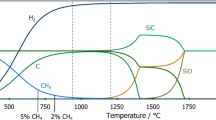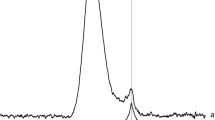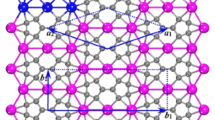Abstract
IN the course of a comprehensive investigation in these laboratories of the mechanisms by which carbon-containing inorganic and organic materials are converted to graphite, the structural changes which occur when single crystals of α-silicon carbide (6H) are heated in vacuo have been studied. Euler and Czerlinsky1 and Mohun2 have recently examined the high-temperature decomposition of silicon carbide by chlorination. In both investigations the residue was found to be amorphous carbon, which showed no structural relationship to the original silicon carbide. It has been stated by Busch3 that silicon carbide converts to graphite on heating to 2,000° C. in vacuum, but no structural studies of this decomposition have been reported.
This is a preview of subscription content, access via your institution
Access options
Subscribe to this journal
Receive 51 print issues and online access
$199.00 per year
only $3.90 per issue
Buy this article
- Purchase on Springer Link
- Instant access to full article PDF
Prices may be subject to local taxes which are calculated during checkout
Similar content being viewed by others
References
Euler, F., and Czerlinsky, E. R., Silicon Carbide, 155 (Pergamon Press, 1960).
Mohun, W. A., Proc. Fourth Carbon Conf., 443 (Pergamon Press, 1960).
Busch, G. A., Silicon Carbide, 160 (Pergamon Press, 1960).
Author information
Authors and Affiliations
Rights and permissions
About this article
Cite this article
BADAMI, D. Graphitization of α-Silicon Carbide. Nature 193, 569–570 (1962). https://doi.org/10.1038/193569a0
Issue Date:
DOI: https://doi.org/10.1038/193569a0
This article is cited by
-
Tailoring graphene for electronics beyond silicon
Nature (2024)
-
In-situ scanning transmission electron microscopy study of Al-amorphous SiO2 layer-SiC interface
Journal of Materials Science (2023)
-
A review on graphene and its derivatives as the forerunner of the two-dimensional material family for the future
Journal of Materials Science (2022)
-
Graphene properties and applications in nanoelectronic
Optical and Quantum Electronics (2021)
-
Si beam-assisted graphitization of SiC (0001)
Applied Physics A (2018)
Comments
By submitting a comment you agree to abide by our Terms and Community Guidelines. If you find something abusive or that does not comply with our terms or guidelines please flag it as inappropriate.



